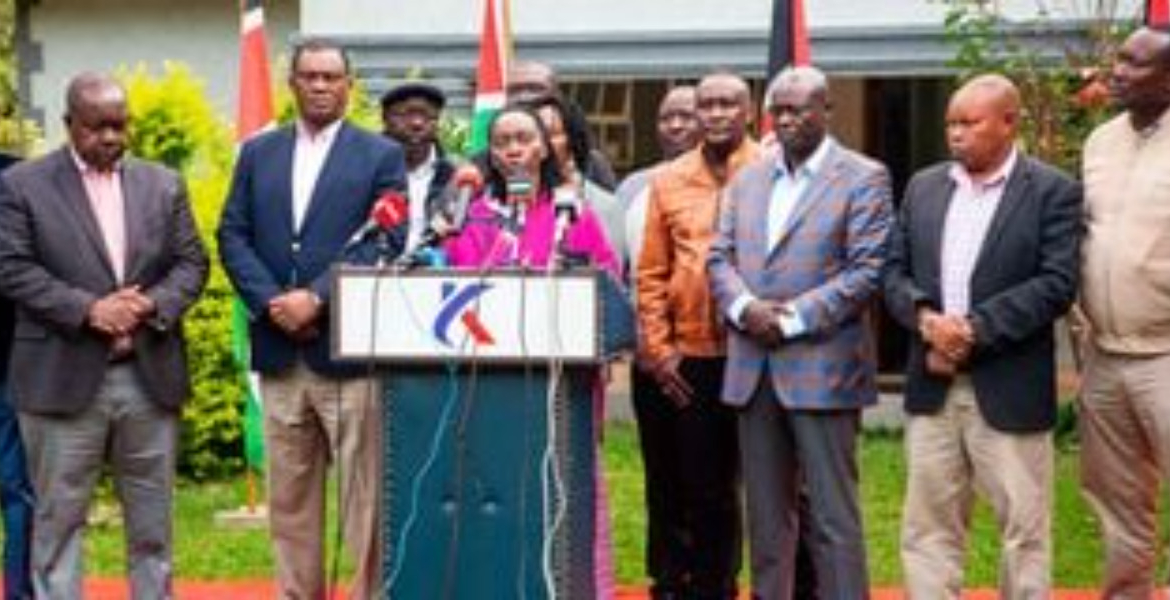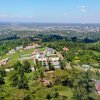Kenya's Opposition Threatened by Internal Power Struggles and Electoral Rivalries

The opposition coalition is grappling with escalating internal disputes that threaten to destabilise its unity.
This casts a shadow over its capacity to mount a credible challenge to the incumbent government. Leadership struggles within key constituent parties, coupled with fierce electoral rivalries in upcoming by-elections, are revealing deep fissures and competing ambitions that could compromise the coalition's cohesion and appeal to voters.
The Democratic Action Party of Kenya (Dap-K), a significant member of the Azimio alliance, currently faces a critical leadership challenge as Trans Nzoia Governor George Natembeya actively campaigns to unseat party leader Eugene Wamalwa. This contest, which has led to internal factionalism, reflects broader anxieties regarding the party’s strategic direction, its overall relevance, and preparedness for the upcoming electoral cycle.
Natembeya, backed by a growing number of party officials and grassroots supporters, is advocating for a major rebranding of Dap-K, arguing that the current leadership has not effectively positioned the party as a national contender. Key allies, including Mumias East MP Peter Salasya and Hospital MCA Erick Wafula, are openly calling for Wamalwa to step down, suggesting he assume a ceremonial role as party patron.
"We have consulted widely, and many believe Mr Natembeya is best suited to lead us into the future," said Wafula, highlighting the escalating momentum behind the leadership change.
However, Wamalwa’s supporters are dismissing the challenge as an opportunistic power grab, accusing Natembeya’s faction of undermining established party structures and circumventing internal protocols. Dan Wafula, a member of the National Executive Council (NEC), described the move as "an attempted coup," stressing Wamalwa’s achievements in building one of the more robust opposition parties in recent years.
Dr Eseli Simiyu, the party’s Secretary-General, has attempted to mediate the conflict by referring the issue to the National Management Committee. He has also expressed concern over the involvement of legal counsel, which he described as "an unusual turn" in party affairs. "I am shocked that party officials who have direct access to me opted to engage lawyers and even offered to fund meetings of party organs, something that has never happened in our history," Simiyu noted in a letter dated 29 July, signalling the severity of the internal discord.
Despite attempts to ease tensions, a recent meeting between Wamalwa and Natembeya in Webuye reportedly ended without resolution, fueling speculation about a potential leadership shake-up. While Simiyu has acknowledged the possibility of leadership transitions, he emphasised the need for due process. "Change is not the issue, process is," he said, reflecting a sentiment echoed by Wamalwa in a recent radio interview.
"If the party elects someone else, I will support them fully. But if I am re-elected, I expect the same level of respect," he said, reaffirming his commitment to democratic internal processes.
Beyond Dap-K's internal troubles, the opposition coalition faces intense competition among its constituent parties in upcoming by-elections, particularly in Malava and Mbeere North constituencies. In Malava, Dap-K is engaged in a contentious battle with the Democracy for the Citizens Party (DCP), led by former Deputy President Rigathi Gachagua.
DCP is supporting Edgar Busiega, a former Amani National Congress (ANC) member who briefly joined Dap-K before defecting to DCP. Dap-K, meanwhile, is backing Seth Panyako, the Secretary-General of the Kenya National Union of Nurses. Cleophas Malala, DCP's deputy leader, has publicly demanded that Dap-K withdraw its candidate in favour of Busiega, citing strategic imperatives.
"Our party leader and the National Executive Council have committed resources to ensure DCP wins more than 50 per cent of the available seats in the by-elections," Malala declared during the unveiling of candidates in Nairobi.
This demand has heightened tensions, with Dap-K refusing to concede, further complicating the coalition's dynamics. The situation in Mbeere North is similarly fraught. The Democratic Party (DP), led by former Attorney General Justin Muturi, is determined to retain the seat vacated by Geoffrey Ruku, who resigned to join the Cabinet. DP argues that its historical claim to the constituency should be respected by other opposition parties.
"We shall field a candidate in Mbeere North and have no intention of ceding ground for DCP or any other party," said DP Secretary-General Jacob Haji, adding that party leaders Kalonzo Musyoka and Eugene Wamalwa support their position.
The multiple candidacies from DCP, DP, and Martha Karua’s People’s Liberation Party in the same constituency highlight a lack of strategic alignment within the opposition. Instead of consolidating support behind a unified candidate, the parties appear embroiled in a zero-sum struggle for dominance, risking fragmentation of the vote and weakening their collective electoral prospects. Furthermore, a growing rift between DCP and the Jubilee Party over the potential presidential candidacy of former Interior Cabinet Secretary Fred Matiang’i is adding to the complexities.
Jubilee is keen to position Matiang’i as its flagbearer for 2027, a move opposed by Gachagua, who prefers that Matiang’i runs on a "home-grown" party to bolster his bargaining power nationally. Some leaders from the Gusii region have suggested the United Progressive Alliance (UPA) as a viable platform, although concerns remain that such a move could be perceived as tribal insularity. Kisii Senator Richard Onyonka has suggested that Gachagua’s push for a distinct party arises from his personal experience of being sidelined within government due to a lack of strong political infrastructure.
"Gachagua has been honest with us that he was kicked out of government because he did not have his party," Onyonka said.
Overall, these developments present a picture of an opposition coalition struggling to balance internal ambitions with the need for unity. The leadership disputes within Dap-K, the turf wars in by-elections, and the competition over presidential candidates indicate a coalition at a critical juncture.





Add new comment